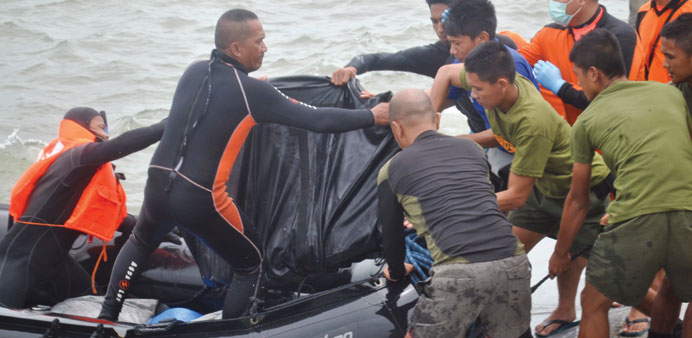Rescuers unload a body bag containing the body of one of the passengers retrieved from the ill-fated ferry at the pier in Ormoc City, central Philippines yesterday.
Agencies/Manila
The death toll from a capsized Philippine ferry rose to 51 yesterday as rescuers tried to right the overturned vessel and found more bodies, a coast guard official said.
The motorised, wooden-hulled boat rolled on its side and overturned minutes after leaving the port of Ormoc City on Thursday. Coast guard Captain Pedro Tinampay said there were 141 survivors.
Passengers said the ferry appeared to turn sharply to the right and was hit by a large wave before it overturned after leaving port in Leyte province, south of the capital, Manila.
“We were given life vests but we were not able to wear them before the ferry sank,” said survivor Rhe-An Garciano.
Panicked passengers crowded the right side of the ferry, causing it to tilt slowly before capsizing, a coast guard spokesman said.
Earlier, anguished families wept over the bodies of dead relatives as the search for survivors from the latest ferry disaster ended yesterday, officials said.
Seven bodies were retrieved from the ship’s upended wooden hull yesterday, including that of a one-year-old boy.
His brother, Gilbert de la Cruz, 10, who survived the disaster, wailed over the dead infant’s remains, which had been placed in a black body bag.
“There’s no more hope for survivors,” Ciriaco Tolibao from the city’s disaster risk reduction and management office told ANC television.
As the search ended, authorities shifted to determining the cause of the latest in a string of deadly maritime tragedies in the sprawling archipelago of 100mn people. “We will get to the bottom of this and make sure that this does not happen again,” Transportation Secretary Joseph Emilio Abaya told reporters.
“Is it force majeure? Is it human error? We have to know all the facts before we talk about culpability.”
Survivors all recounted how the vessel was backing out of port when it suddenly overturned, giving them no chance to put on life jackets.
Its brightly painted orange and green bow bobbed above the choppy waves yesterday.
The wreckage was later to be towed closer to the shore where it will be righted, Abaya said.
Government investigators will question the vessel’s 14 crewmen, all of whom survived, he added.
The young survivor, de la Cruz, comforted by his equally distraught father, said he survived by clinging to empty water drums that kept him afloat until the coast guard rescued him.
The boy said he was standing near the deck when it tilted, allowing him to jump into the water.
But he was unable to warn his mother and two siblings. The father was not on board the boat.
“I’m very sad because I don’t know if they are still alive,” he said before his youngest brother’s remains were brought to shore.
His mother and other younger brother also perished in the disaster and their bodies were among the seven retrieved yesterday.
“I am never riding a boat again,” he said, as he was comforted by an aunt whose eyes were swollen from crying.
Nicasia Degesica, a 57-year-old seamstress, waited at the port for news of her sister, Erlinda Rosales, while other devastated relatives checked hospitals and morgues for their loved ones.
“We’re losing hope that she is still alive, but if she’s dead at least we want to find her body,” Degesica said.
Divers briefly stopped their search in the morning as the waters became choppy due to Tropical Storm Linfa, which was set to brush past the northern Philippines later, said Chief Superintendent Asher Dolina, one of the ground commanders.
The state weather service issued a gale alert for the central Philippines early yesterday, warning of turbulent seas churned up by the storm.
Waves up to 4.5 metres high could overturn boats that try to leave port in these conditions, weather forecaster Gladys Saludes said.
Poorly maintained, loosely regulated ferries are the backbone of maritime travel in the Southeast Asian nation, with many sea disasters occurring during typhoon season in the second half of the year.
Frequent accidents in recent decades have claimed hundreds of lives, including the world’s worst peacetime maritime disaster in 1987 when the Dona Paz ferry collided with an oil tanker, leaving more than 4,300 dead.

